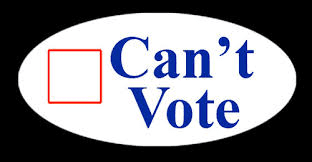
“Well I can’t vote for any of them anyway. I have a felony.”
I might have heard a statement like that at least a hundred times when I was registering voters during my fellowship with New Virginia Majority. It was 2014 and I was chosen to participate in a Virginia initiative created to commemorate the 50th Anniversary of the 1964 Freedom Summer––a campaign that sought to register as many as African Americans as possible in Mississippi.
That year, I found myself walking in the footsteps of Freedom Summer volunteers, but this time we were expanding our voter registration outreach in Virginia to immigrant communities and to people who were convicted of felonies. I walked around a dozen different neighborhoods in the state with a bookbag full of voter registration applications. Me and three other fellows were excited to register new voters. Naively, I thought I would be spending the majority of my time trying to get people to understand the importance of voting, but I was wrong. Virginians wanted to vote–but current laws were preventing more than half a million people in the state from exercising their right to vote due to being convicted of a felony.
Instead, I spent the majority of my time connecting people with felony records to lawyers equipped to help them get their voting privileges back. Virginia is one of only four states that has permanently denied voting rights to people with felonies.
Virginia’s History of Denying Voting Rights
Historically, Virginia elected officials and wealthy businessmen did everything they could to silence Black voters. The Virginia Constitution of 1902 allowed for men over the age 21 to vote but included a clause that permitted people convicted of felonies from voting. In the era of Jim Crow, the Virginia Constitution of 1902 formalized other racist policies in an effort to limit the political power of newly freed African Americans.
Examples include:
- A poll tax that forced voters to pay a hefty fee of $1.50 or $4.50 if you were a new voter. (Equivalent to over 40 dollars or 100 dollars, respectively).
- Confusing literacy tests designed for the test maker to fail. You can take an example of the literacy test here.
Passing the literacy tests was extremely hard for some African Americans who had been banned from learning how to read and write while enslaved. The literacy tests were successful in kicking off hundreds of thousands of Blacks of voting age from registration lists. Poll taxes that were implemented a couple of years later further cut those numbers down.
When felony convictions, literacy tests, and poll taxes couldn’t keep African Americans from voting, white supremacists tried different methods: violence and murder. Between 1877 and 1950, more than 90 people were lynched in Virginia. Most of them were African American men, women, and children.
During the Freedom Summer of 1964, people from all over the United States ventured to Mississippi to register Black voters, but everyone didn’t support the initiative Volunteers regularly faced intimidation and threats of violence. James Chaney, Andrew Goodman, and Michael Schwerner were among those volunteers. In June, their bodies were found murdered after they were set on fire. Among those convicted of their murders were members of the police department and the Ku Klux Klan. In fact, a few were members of both.

Where are we today?
The suppression of Black voters continues. In Virginia, 21.9 percent of African Americans are disenfranchised due to having felony convictions on their record. When states take away a person’s right to vote they are silencing millions of voices on issues such as reproductive rights, education, and immigration. Shouldn’t we all have a right to choose a representative that cares about our issues?
We expect people returning home from prison to become productive citizens but we aren’t giving them the tools they need to thrive. Along with education, mental health services, and job training, they should be allowed to exercise their civic duty. By continuing to disenfranchise ex-offenders, we are perpetuating racism. Individuals who have paid their debt to society by completing their sentences and probation or parole, should have their civil rights restored and have a second chance to be a full citizen.
The United States of America is the only democracy that automatically prevents previously incarcerated people with felony convictions from voting but Virginia is slowly changing that. In April of 2016 former Governor McAuliffe issued an executive order granting voting rights to everyone who had been convicted of a felony in the state. His order was challenged in court by the state GOP and the Virginia Supreme Court deemed his executive order unconstitutional, deciding that the restoration of voting rights process must be done on a case-by-case basis. Since then, McAuliffe and Governor Northam have made attempts to streamline the process of restoring your rights. Individuals may now contact the Secretary of the Commonwealth (SOC) through their website. The office of the Secretary of the Commonwealth then reviews their records and upon the Governor’s approval, the SOC will issue a personalized restoration order to the individual. We need to continue this work by voting for progressive candidates that support a state constitutional amendment to automatically restore rights.
We have elections for the General Assembly coming up on November 5th. Take a look at the thirteen progressive candidates we’ve endorsed and use your voting power to demand that our elected officials advocate for the restoration of rights. Stay up to date on criminal justice reform by following us on Facebook!
Check the status of your civil rights or request help in restoring your rights here.
Check Out Other Content on criminal justice reform in Virginia: